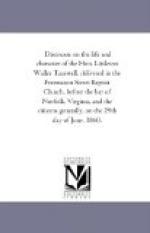in Richmond, and to battle for the victory. He
was accordingly returned, in 1799, by the Borough
of Norfolk to the House of Delegates, on the floor
of which the contest was to be decided. At the
session of the previous year, the Assembly had passed
the celebrated resolutions of John Taylor of Caroline,
long since known to have been written by Mr. Madison,
which had been sent to the several states. The
leading object of the present session was to refer
the answers of the states to a committee, and to report
an argument in defence of the resolutions of the previous
year. The report, since so well known as the
Report of ’99, or the Virginia Report, drawn
by Madison, was the consequence. When it was presented
to the House of Delegates, it was discussed by the
prominent men of both parties with eminent ability.
Young Taylor performed his part with his usual zeal
and force, and, by the side of his illustrious namesake,
George Keith Taylor, opposed the adoption of the Report,
which prevailed, however, by a decided majority.
He also sustained Mr. Adams for the presidency in
preference to Mr. Jefferson; and, when Mr. Jefferson
was elected, he opposed his administration up to 1802,
when Tazewell came to reside in Norfolk. Though
opposed then, and as long as he lived, to the party
which, with few and short intermissions, has controlled,
from 1789 to the present day, the political action
of the state, his devotion to our blessed mother was
as pure and as ardent as was ever felt by any son
who drew nurture from her bosom; and he was as prompt
to avenge her wrongs as to assert her rights—at
once a D’Aguessau in the forum and a Bayard
in the field. Nor was that affection unreturned.
When the clouds of war were gathering round her, Virginia
entrusted her safety and her honor to his sword; and
when the returning light of peace shone upon her hills
and valleys and over the green savannahs of the East,
and he had withdrawn from the arena of his splendid
fame, she invested him with her ermine, which he wore
with becoming grace to his dying hour; and she stood
in tears at his tomb.
In this young man, Tazewell was to find an intimate
friend, a fit, an able, and a lifelong competitor.
They were nearly of the same age: they had been
classmates in College, and had been in the Assembly
together; and while Tazewell was studying law in Mr.
Wickham’s office in Richmond, Taylor was following
suit a few doors off in the office of Gen. Marshall.
Even on the score of physical beauty they were not
unmatched. Though belonging to different models,
each in his sphere was, in youth, in middle life,
and in old age, among the finest looking men of their
generation. Sometimes the aspect of Taylor was
magnificent. I saw him one afternoon thirty years
ago as he was returning from the court in Portsmouth.
He was passing from Toy and King’s corner to
Hall’s. The waves of recent debate were
sweltering in his breast. His person was erect;
his gait was rapid; with one hand he held his cloak
in a graceful fold, and with the other he grasped
his ivory curule staff. I thought of Cicero hastening
up the Capitoline hill to announce in the forum the
death of Catiline on the Picenian plain and the slaughter
of the traitor’s band.




